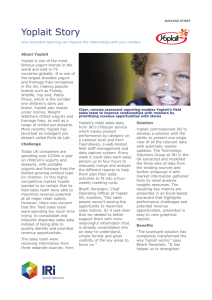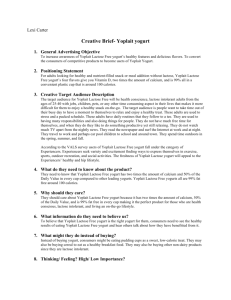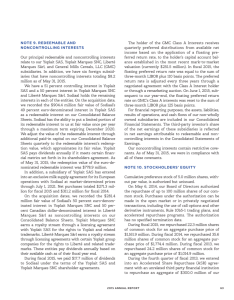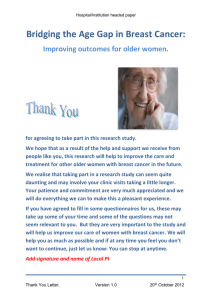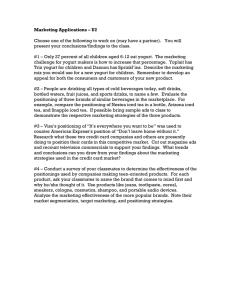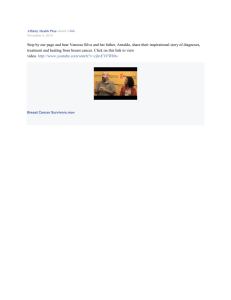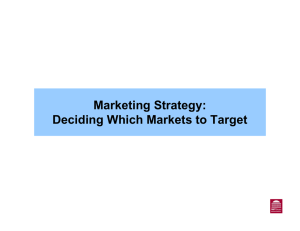vs. Economic Growth Betterment of Health
advertisement
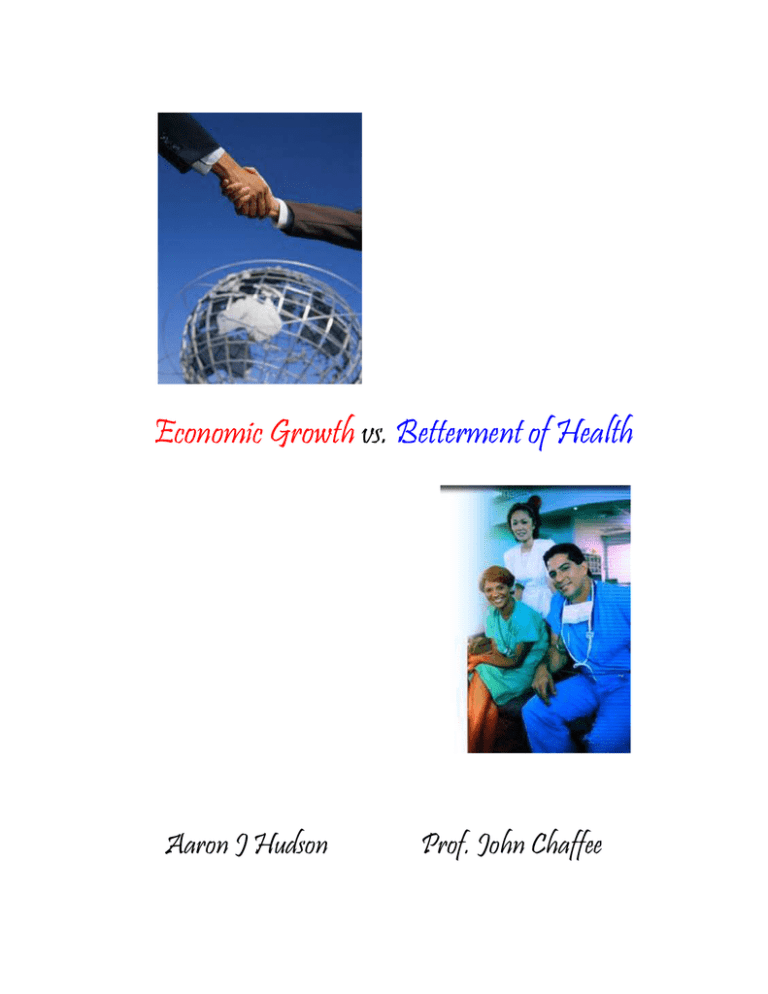
Economic Growth vs. Betterment of Health Aaron J Hudson Prof. John Chaffee Life is valuable; so valuable and precious that it is often taken for granted. It is assumed that the next day will come and life will go on as usual. It is also assumed that our lives are so resilient to anything foreign, we subject our bodies to harsh chemicals and toxins on a daily basis without a second thought or care. Is that an assumption or is that lack of knowledge of what we really subject our bodies to? But wait; am I speaking of every individual who walks our depleting Earth? Or am I speaking of our capitalistic economy that sees the green lining their pockets more important than the green we walk on? This past week was filled with guest speakers who spoke on various topics which related directly to and questioned the ethics of business. I have chosen to use Dr. Karlyn Koh’s subject of Ethical Issues in Science and the Forum on Public Health and the Environment to clarify my views and analysis of the question at hand. We prepped for Dr. Koh’s class by reading an article by Michael Pollan titled, “Playing GOD in the Garden”. This article focused on a new breed of potatoes called the New Leaf Superior which has been genetically engineered to produce its own insecticide. This is an ingenious idea for the farmers of these potatoes. Theoretically, this potato has a built in security system that destroys those pesky beetles who decide to take a nibble on them. Not a theory any longer, these new breed of potatoes do just that; after these beetles take a bite of the “alien” potato, they digest a bacterial toxin which has proven to be fatal. Well, does this fatal toxin have the same effect on humans? Has this theory been tested by the manufacturers of this super spud? Or does it matter to them at all? Per Phil Angell, employed by Monsanto, says the following, “Monsanto should not have to vouchsafe the safety of biotech food, our interest is in selling as much of it as possible. Assuring its safety is the F.D.A.’s job.” This is a direct quote from the manufacturer themselves who says is layman terms, we’re not worried about safety, income is out primary concern. How do we as Americans take this response? This article was written in 1998 so by now we may have been eating these mutant spuds for sometime now without even knowing it. It is obvious from this quote alone that our safety is not a factor in the eyes of the corporations manufacturing the food we eat. It’s that bottom, double-underlined, line that matters most. So do we, as Americans, have a little more care about our intake of pesticides, I meant food? Here’s another situation… The Forum on Public Health consisted of a panelists of individuals focusing on Breast Cancer, what we can do to prevent this disease, and the blind eye that corporations want us to have when it comes to their so-called efforts in fighting this disease. Barbara Brenner of Breast Cancer Action in California, Laura Weinberg of the Great Neck Breast Cancer Coalition, and Karen Joy Miller of Prevention is the Cure were all very organized, knowledgeable, and thorough in the presentations. There are so many organizations and corporations who paint such a beautiful picture of their efforts in helping the fight against Breast Cancer, but, underneath the façade of lies, there lies the truth that the majority of funds donated to the cause are recycled right back into their organization. Let’s take Yoplait Yogurt for example; they offer to all their consumers that for every label of yogurt sent back to their corporation, the corporation will donate “X” amount of cents to the Breast Cancer Coalition. This is a not so obvious gimmick that touches the hearts of sincere consumers who in turn does this to “do their part” and expect Yoplait to fulfill their end of the bargain. Yoplait does their part and donates cents on the dollar, for every label returned, to the Breast Cancer Coalition. But here’s how they get you; the amount of Yoplait a consumer needs to eat, the number of labels that are sent back to Yoplait, and the postage used to send out the labels directly relates to Yoplait’s profits. Yoplait still makes out with the upper hand. The money they donate does not come close to the profit they make on their increased sales of their yogurt. An even larger contradiction with Yoplait’s gimmick is that some of the ingredients used to make their yogurt…are cancer causing. This alone defeats the entire purpose of the Yoplait organization. Again, we see that even though the primary objective is a little more subtle than Monsanto and their super spuds, Yoplait’s number one goal is still their income. Business ethics? In my mind, this is not only an oxymoron, but it’s just about non-existent. Everything comes down to money. It is not about the green we walk on, but the money that is made from such non-ethical values. Our health is important to us, each individual. But the ugly monster of capitalism rears its head and suggests that our primary focus should be to succeed rather than to adhere to our health.
